The Grand Master
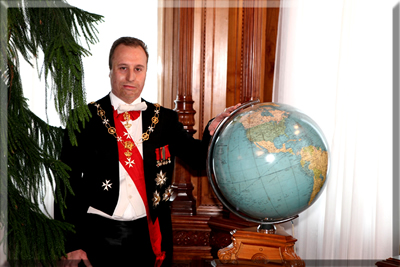
The Grand Master of the Sovereign Order OSJ is the Chief of the Name and Arms of the Royal House of Paternò Castello of Valencia and Sardegna, he being H.R.H. the Prince Don Thorbjorn Paternò Castello Guttadauro of Valencia, Ayerbe, Aragon, Carcaci and of Emmanuel. Born in 1976 in Monldal, Sweden, at the age of 31 he became the Grand Master of the Sovereign Order OSJ, his succession having been expressly desired by the father the Royal Prince Don Roberto II, and having been approved by the eldest brother Royal Prince Don Francesco I, at the time Head of the Royal House of Aragon. The curious reader will probably wonder why in the line of the Royal House there are two Princes in line for succession and two Heads of two different Royal Houses.
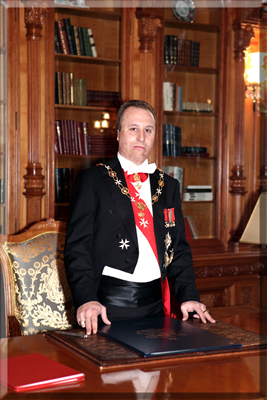
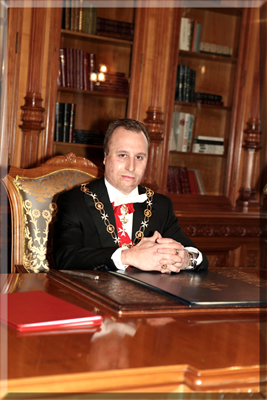
Once amongst all of the lines of the House of Paternò, an exceptional cadet line was chosen, which was that of Paternò Castello and Guttadauro, Princes of Emmanuel. Let it be remembered that the decision was made by means of a family conclave in Palermo on June 14th 1853, in which all Heads of the various Paternò branches intervened and noted various precedents in which a princely or royal family autonomously controlled the laws of succession. In the Family Pact, drafted by a deed by the notary Gioacchino Accardi, it is mentioned that Don Mario was chosen as a representative of the regal successor of the House, because he was “the only one in which royal Aragonese blood flowed twice over”: as Paternò as well as Guttadauro. Whosoever objected that the Aragonese transmission of power passed, as with that of the title of Prince of Emmanuel, by the female line, it was specified that in Aragon the Salic Law was not being practiced, and therefore the female line was put into effect, as went for Sicily (Gt Galuppi, present State of the Messina Nobility, Milan 1881, p. 1-23) as inferred by the Constitutions in aliquibus of King Federico II, which permitted succession by the female line (Costitutions Regni Siciliae, liber. 3 tit 26).
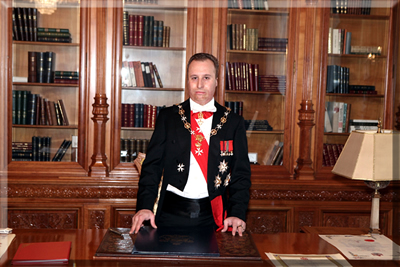
In the Kingdom of the Two Sicilies the Salic Law was indisputably observed for the most part, but concerning Sicily, the application of the Salic Law was subject to the limitations of tradition, even under the Bourbon Dynasty. The countercheck can be attributed to the opinion expressed by the Royal Commission of Noble Titles (2.2.1860) and from the same decree by Francesco II of the Two Sicilies (9.16.1860), both favoring the succession of the title of Prince of Emmanuel by the female line. The Royal Prince Don Roberto II also desired to divide the noble, heraldic, and chivalrous assets between his sons, inherent with their full rights and prerogatives. Four verdicts regarding the Paternuense Dynasty confirmed a common blood line with the house of Aragon -Majorca - Sicily and the legitimacy of Fons Honorum. The first unified magistrates’ court of Bari, March 3rd 1952, n. 485, becoming irrevocable in the forms of law, asserted that "the Princely Paternò family had origins from Giacomo I the Conquistador, descendent of the Counts of Guascogna, of the King of Navarra and the King of Castile";
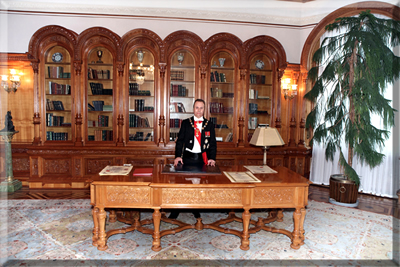
The second verdict of June 5th 1964, n. 119, of the Penal Tribune of Pistoia, a sole chapter, expressly confirmed the legitimacy of fons honorum of the Royal House of Paternò to the greatest degree, inasmuch the legitimacy of the heir of the Paternò family derives from the proven legitimate descendance of a member of the Royal House of Aragon; The third arbitral sentence of January 8th 2003, n. 50, executive declaration with the decree of the President of the Trial Court of Ragusa 17.02.2003, n. 177, declared that the Head of the Royal House was under the jurisdiction of "sovereign prerogatives connected to jus majestatis as well as jus honorum, with the right to confer noble titles, with or without predicate, noble emblems, titles of honor and chivalry relative to hereditary family orders; subject to international law as the grand master of a non-national order by purposes of the law of March 3rd 1951, n. 1978 ". The fourth arbitral sentence of December 5th 2009, n. 709/09 executive declaration of the territory of the Italian Republic with the decree of the Trial Court of Ragusa, confirmed fons honorum for the Head of the Royal House of Paternò Castello of Valencia and Sardinia with all the prerogatives annexed and connected to the quality of His Royal Highness, with the faculty to concede Noble Titles with or without predicate, noble emblems, honorable and cavalier titles relative to the equestrian order of the family; the subject of international rights and of the grand master of the order ;
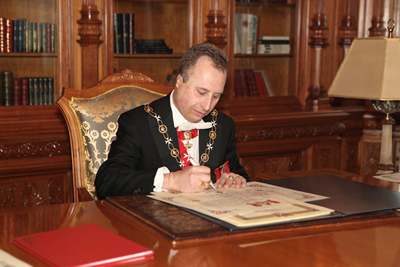
subject to international law and as grand master of non-national orders by purposes of the laws of March 3rd 1951, n. 178. It is generally acknowledged by noble right that the Head of a former or currently ruling dynasty reserves jure sanguis, namely for hereditary rights, the faculty to confer cavalier and noble honors, dictated by jus honorum (as contributor he is dictated hons honorum, the source of honors), reserves their sovereign right independently from political changes and territorial considerations and that these rights are mentioned “in pretense”, by which terms the Successor who maintains and/or exercises them holds the right to them everlasting (source: Renato de Francesco, The legitimacy and Validity in Italy of the “non-national” Knightly Orders, Ed. Ferrari, Rome, p. 10). The Italian Law of 1953 recognized the existence of the Order as a non-national body and distinguished it by the State level, as are other bodies that are not private, entities nor associations. Of particular interest are those founder of Dynasties, who do not reign: according to the aforementioned law such Orders are legitimately awarded and therefore valid. The absence of a territory is not recognized as a hindrance; the possession of such is in fact subject to political vicissitudes, which do not affect the right and the legitimacy of succession. In the case of the Successor, as the concept of a population, it is substituted by “supporters”: people who through various means support the “cause” of the Successor. International relations are subject to political evaluations and to the relative “declarative behavior” of governments, those of which, in an altered nature of the States, (the “popular vote” has substituted “divine right” of the Sovereigns), do not recognize the “successors” of previously reigning Sovereign Houses, except for the pursual of international political purposes.
Order Of The Knights Of Saint John Of Jerusalem - OSJ





